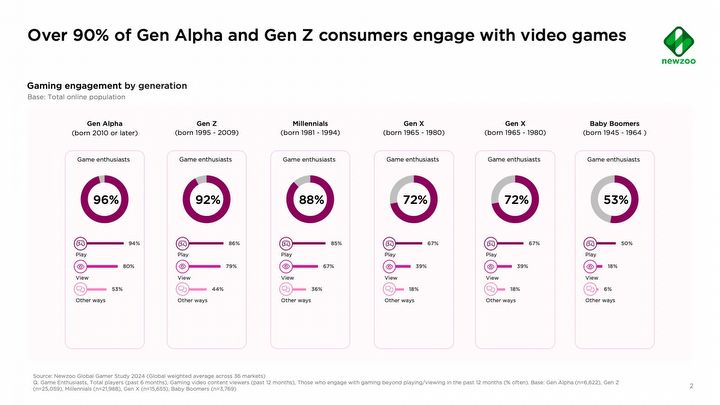Games Bring Generations Together; Their Fans Are 85% of Internet Users
Newzoo's new report is further proof that video games are no longer the domain of only the youngest generations.

Video games have long ceased to be the domain of children and teenagers. This is confirmed by the new edition of the Global Gamer Study titled "How Consumers Engage With Games Today," a survey in which 73,000 people were interviewed online. Result: 85% of internet users can be considered "game enthusiasts," and 80% of all respondents actively play games (via GamesIndustry.biz).
Intergenerational "enthusiasts"
Data collected by Newzoo shows that 53% of people born between 1945 and 1964 “engage” in video games. Keep in mind that the creators of the report define "engagement" as a person either playing themselves or participating in activities related to video games within 12 months, such as watching podcasts or materials, discussing them with loved ones, and so on. However, at least 50% of them had played independently in some game at least once a year.
It's also not surprising that the proportion of players in different generations increases as the age of the respondents decreases. Even in the 1965-1974 age group, 71% of respondents had "engaging" contact with games, and 96% of those born after 2010 are game enthusiasts (94% played at least once in the last 12 months). In this last group, the average weekly playing time is around 5.2 hours, making it the most prevalent activity among these users, even surpassing social media in the competition for their time.
Mobile games, console and PC expenses
The report also mentions the most popular titles, although the category "adventure" is perhaps a bit too broad in the three youngest generations. The respondents gave examples of games such as Minecraft, GTA, Call of Duty, and Fortnite. In the case of older generations, logic games were more often mentioned.
Console and PC players are the ones spending the most money, despite the confirmed dominance of mobile games. The authors of the study even claim that "PC and console players are more likely than mobile players to spend on various combinations of titles, DLC launches and content, microtransactions, and other in-game purchases."
Moreover, these people are more willing than "mobile" game fans to pay for a purchase "upfront," i.e. for premium titles.
Giants of games and seekers of the new
Furthermore, Newzoo data confirms earlier reports from January that the most popular titles generate the most interest and profits for publishers.
80% of the gaming time was spent on only 66 games, despite over 14.5 thousand titles being released on Steam alone in 2023. Even though 31% of console and PC gamers explore new or trending titles and invest heavily in electronic entertainment. (Another thing is that 38% of them mainly look at the visual presentation).
It may also be surprising that these "innovation seekers" mainly come not from the USA, Japan, or even Europe, but from China, India, Vietnam, Saudi Arabia, and Egypt (where these players make up about 35%). Japan is practically at the very end (15%).
- 280 billion Democracy's enemies killed and 1.5 billion bombs dropped. Helldivers 2 devs recap year one of the Second Galactic War
- A major London analyst company predicts a stagnating PC market and rising console sales
- Split Fiction reaches big milestone faster than KCD2. The game kicked off a stunning score on Steam
- Steam continues to break record after record. Valve's platform and its biggest hit have never attracted so many players
- Gamers love older games and favor PCs over consoles. More than 900 million people already play on rigs
